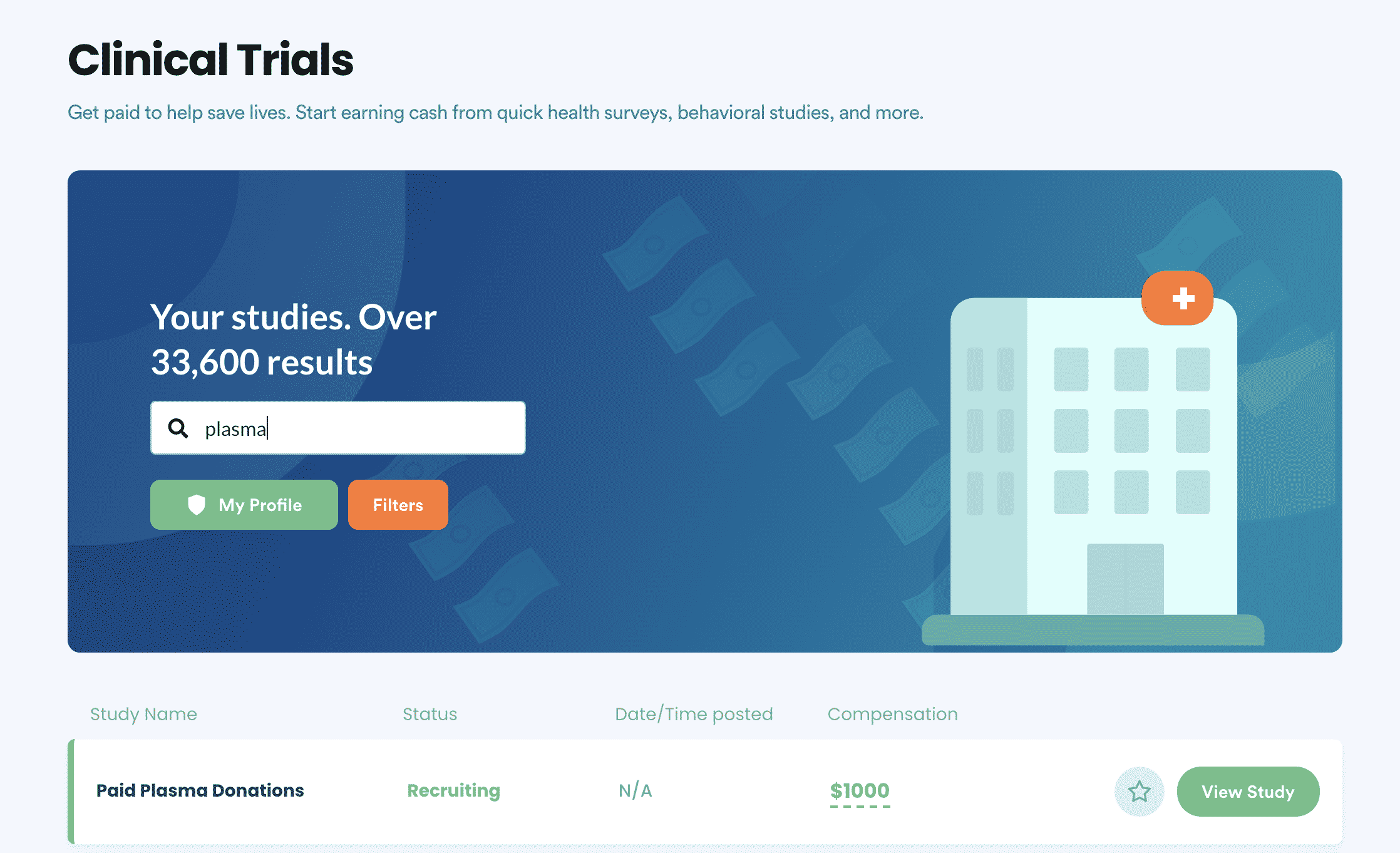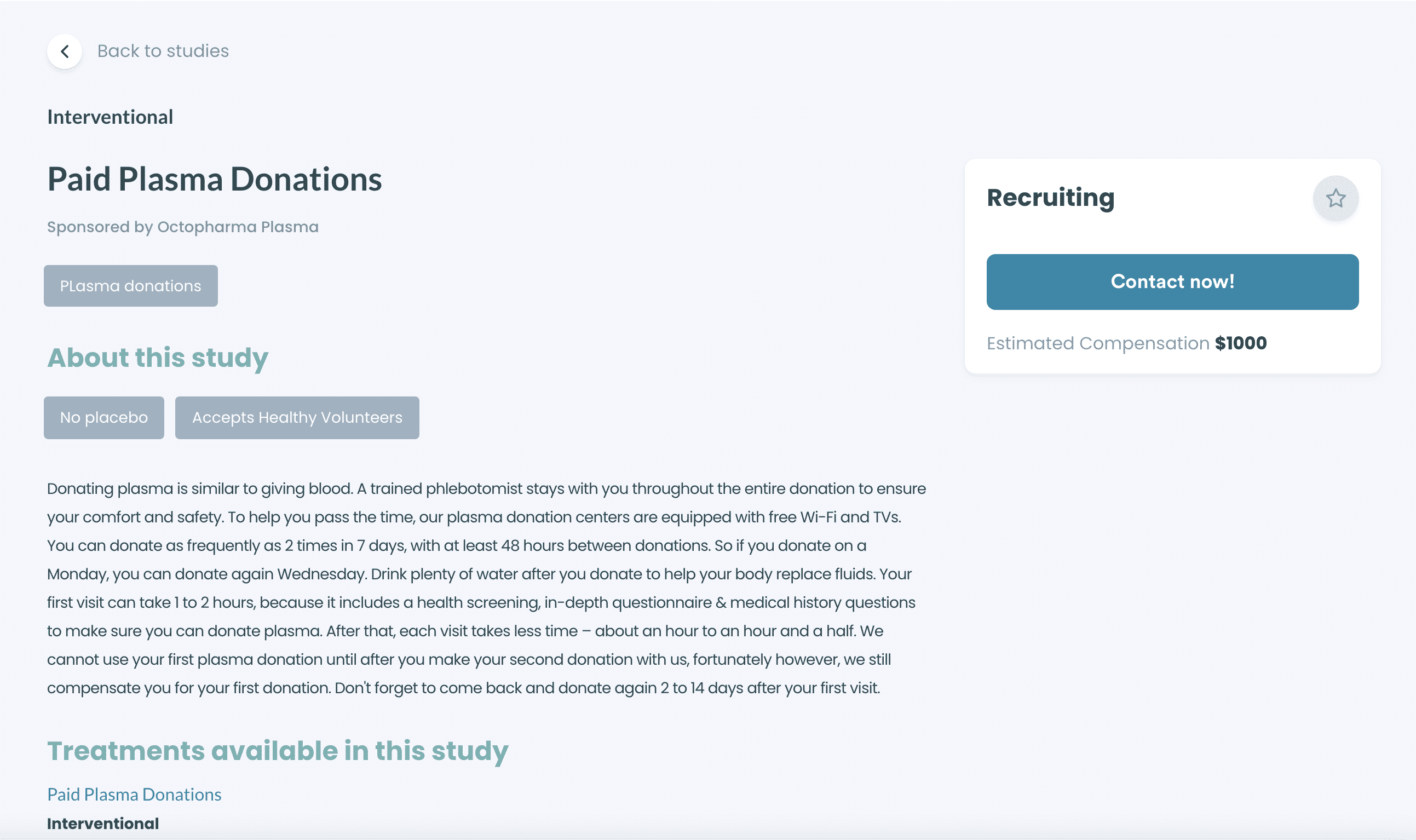Everything You Need To Know About Plasma Donation
Plasma donation saves and improves the quality of life of many suffering patients. You can impact someone's life by donating your blood or plasma and getting an incentive for it. Plasma donors can be compensated with up to $75 per donation.
It is not easy to find a blood and plasma donation center that offers good compensation for plasma donation. DoNotPay helps you learn everything you need to know about plasma donation and find a good center that will compensate you fairly.
What Is Plasma?
Plasma is the liquid part of the human blood, free from all other blood components. The liquid is amber and makes up 5% of the total blood capacity. Plasma contains the following main constituents:
- Water
- Salts
- Enzymes
The main function of plasma is to transport proteins, nutrients, hormones, and cell waste to their respective destinations.
With plasma being such an important component in our bodies, donation centers must have enough supply for those that need it. This is where comes in.
Why Donate Plasma?
Patients suffering from trauma and blood shortages require plasma to recuperate. The added plasma helps boost their blood volume, helping them prevent shock and clot bleeding. The following patients need plasma therapy for their recovery:
- Trauma patients
- Burn patients
- Shock patients
- Patients with severe liver disease
- Patients with multiple clotting factor deficiencies
Other than making an impact on needy patients' lives, plasma donation can help you get some extra income. However, you cannot rely on plasma donation as your main source of income for two reasons:
1. You can only donate plasma twice a month
2. The money you get from plasma donation is not a payment but a compensation bonus which is often not high enough to pay for all your bills
What Are the Plasma Donation Eligibility Criteria?
The general eligibility criteria for plasma donors are:
- Must be an adult; 18 years or older.
- Must weigh at least 50 kg or 110 pounds.
- Test non-reactive for transmissible viruses such as hepatitis and HIV.
- Follow a recommended diet, including at least 50 grams of daily protein.
- Must pass a medical examination.
- Complete an extensive medical history screening.
Some conditions will prevent you from donating plasma. People with the following conditions cannot donate plasma:
- Certain chronic illnesses, such as hepatitis and HIV.
- People currently receiving antibiotics for active infections.
- Tuberculosis patients.
- People suffering from Low iron, fever, productive cough, or are generally feeling unwell.
- People who have traveled to areas with recorded cases of disqualifying illnesses such as Ebola or Zika virus.
Where Can I Donate Plasma?
There are numerous plasma donation sites all over the country. To find the donation center near you, you can use the following websites and search via your area zip code:
How Much Do I Get from Donating Plasma?
The compensation you get for plasma donation varies with the organization you donate to. The highest paying donation organizations include:
| BioLife Plasma Services | Pays about $20 for your first visit and $30-50 for subsequent donations. |
| BPL Plasma | Pays between $20-60 per donation depending on the amount of plasma you donate and any referral code you might have. |
| Biotest Plasma | Pays $50 for their first five donations, dictated by a compulsory 10-day difference between donations. |
| CSL Plasma | $50 for your first donation and reduces with every donation. |
Can I Donate Plasma if I Am Diabetic?
Yes, you can donate plasma if you have diabetes, but you must meet certain conditions. As long as you have no diabetes-related complications such as eye, heart, blood vessel, or kidney, you are safe to donate.
However, you need to control your diabetes by changing your lifestyle and taking regular medication. If you are under active insulin medication, you need to contact a donation center to check whether you donate plasma.
Can I Donate Plasma after Receiving the COVID Vaccine?
Yes, you can donate plasma after receiving the COVID-19 vaccine. You are eligible to donate plasma if you are feeling well and have no COVID-19 symptoms. You, however, need to provide complete information regarding your vaccination, including the manufacturer name of the vaccine you received.
What if I Can't Donate Plasma on My Own?
You might not find donation centers near you that give you the deserving compensation for plasma donation. Donating plasma in some centers also takes very long. DoNotPay helps you narrow down your search and get the best donation center for your plasma.
Here's how you can use DoNotPay to become a plasma donor:
- Search "plasma donations" on DoNotPay and find the nearest donation clinic through our clinical trials product.

- Select the "Contact Now" button to learn more about eligibility criteria, contact the clinic with questions, or sign up for first-time donor bonuses.

- Verify your information and submit your inquiry! DoNotPay will contact the clinic on your behalf and ensure your questions get answered.

Why Should I Use DoNotPay?
DoNotPay is a one-stop-shop for all your administrative and needs. We work with all government entities and private companies to solve your problems. Our services are fast, convenient and reliable.
We are not restricted to finding the best center around you. Visit our website to access the endless list of our services, including:
- Accessing your insurance claims
- Getting free clinical trials near you
- Getting any form of fee waivers
- Getting help paying your bills
- Requesting sick leaves
 By
By